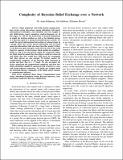Complexity of Bayesian Belief Exchange over a Network
Author(s)
Mossel, Elchanan; Rahimian, Mohammad Amin; Jadbabaie-Moghadam, Ali
DownloadMossel - conf paper for CDC 2017.pdf (340.5Kb)
OPEN_ACCESS_POLICY
Open Access Policy
Creative Commons Attribution-Noncommercial-Share Alike
Terms of use
Metadata
Show full item recordAbstract
Many important real-world decision making prob- lems involve group interactions among individuals with purely informational externalities, such situations arise for example in jury deliberations, expert committees, medical diagnosis, etc. In this paper, we will use the framework of iterated eliminations to model the decision problem as well as the thinking process of a Bayesian agent in a group decision/discussion scenario. We model the purely informational interactions of rational agents in a group, where they receive private information and act based upon that information while also observing other people’s beliefs. As the Bayesian agent attempts to infer the true state of the world from her sequence of observations which include her neighbors’ beliefs as well as her own private signal, she recursively refines her belief about the signals that other players could have observed and beliefs that they would have hold given the assumption that other players are also rational. We further analyze the computational complexity of the Bayesian belief formation in groups and show that it is NP -hard. We also investigate the factors underlying this computational complexity and show how belief calculations simplify in special network structures or cases with strong inherent symmetries. We finally give insights about the statistical efficiency (optimality) of the beliefs and its relations to computational efficiency.
Date issued
2017-12Department
Massachusetts Institute of Technology. Department of Civil and Environmental Engineering; Massachusetts Institute of Technology. Department of Mathematics; Massachusetts Institute of Technology. Institute for Data, Systems, and Society; Massachusetts Institute of Technology. Laboratory for Information and Decision SystemsJournal
2017 IEEE 56th Annual Conference on Decision and Control (CDC)
Publisher
Institute of Electrical and Electronics Engineers (IEEE)
Citation
Rahimian, M. Amin, Ali Jadbabaie, and Elchanan Mossel. “Complexity of Bayesian Belief Exchange over a Network.” 2017 IEEE 56th Annual Conference on Decision and Control (CDC) (December 2017).
Version: Author's final manuscript
ISBN
978-1-5090-2873-3